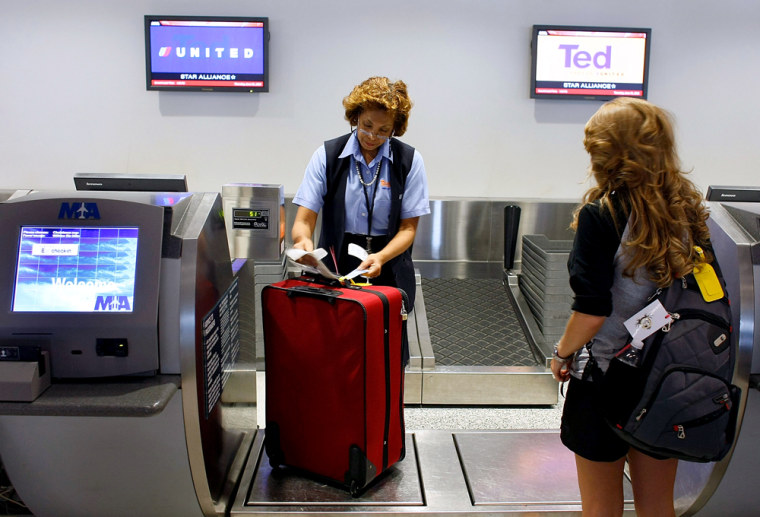The Masters of the Universe, it seems, are staying home.
That’s right, after years of living large and flying first class, the folks who brought you the subprime-mortgage mess, the ensuing credit crunch and the specter of complete economic collapse are cutting back on their travel. And with the stock market skidding to new lows — down 370 points yesterday — they may be staying put for quite a while.
Who cares, right? Well, as observers far smarter than yours truly have pointed out, the mess on Wall Street affects everyone who has a 401(k), uses a credit card or, for that matter, intends to travel in the coming months. In fact, regardless of the effectiveness of the government bailout passed last week, this holiday season is already playing out in some surprising ways.
The high cost of tight credit
Already wracked by high fuel prices and falling demand, the airlines will face increasing financial headwinds as long as credit is constrained. “The industry is based on something like 80–85 percent credit card sales,” says airline consultant Robert Mann of R.W. Mann & Co., “and the credit-card settlement firms have been increasing their holdbacks [i.e., the funds they hold back from the airlines].” Less cash on hand and tighter credit overall (for payroll, purchases, fleet upgrades, etc.) is not a formula for healthy growth.
Nor does it help that the aforementioned MOTUs — the financial ones, not the action figures — are suddenly less inclined to spend big bucks on first-class and business-class tickets. “That premium traffic,” says Steve Lott, spokesman for the International Air Transport Association (IATA), “is the airlines’ bread and butter.”
Consider some ballpark figures Lott has compiled. Last year, Lehman Brothers booked roughly $115 million in air travel; Merrill Lynch, $80 million, and AIG, $60 million. Buyouts (Merrill Lynch) and bailouts (AIG) will keep some high fliers flying, but much of that business isn’t coming back.
Meanwhile, the surviving banks and financial services companies — and the thousands of businesses that rely on them for affordable credit — will have no choice but to cut back. “They won’t cut out travel altogether,” says Lott, “but they’ll try to reduce their costs. And any reduction in their travel is not good news for the airlines.”
Nor, it seems, for the rest of us. Clearly, the airlines are going to have to make up that revenue somewhere else.
Home is where the heart and bargains are
They’ll do it, of course, by continuing to tack on extra fees while raising fares wherever they can (essentially where Southwest doesn’t fly). The occasional fare sale will still pop up — usually with limited availability and onerous restrictions — but, more often than not, fewer seats at higher prices will be the order of the day.
And yet, says Mann, “It’s remarkable how resilient leisure travelers have been through all this.” Even with higher fares, he says, many carriers are reporting that fourth-quarter bookings are ahead of expectations, which, he adds, “is translating into some very sizable increases in unit revenues. It’s a reflection of people’s understanding that there are just fewer seats out there.”
In other words, going home for the holidays may be non-negotiable, and many of us will bite the bullet and pay up. Vacation-oriented travel, on the other hand, is more discretionary and will likely take a significant hit. “When a trillion bucks in paper wealth goes away overnight,” notes Mann, “that sends a message as to whether people want to be making that extra trip to the islands.”
An industry in transition
For Hunter Keay, a financial analyst with Stifel, Nicolaus & Co., the difference between those two trip types speaks directly to the resiliency of the traveling public, not to mention the prognosis for air travel during the holidays and beyond.
Holiday travelers, says Keay, can be considered VFRs (as in visiting friends and relatives): “It’s the guy who catches a plane to see his in-laws over Christmas. He’s going to be willing to spend an extra 20 percent on airfare because he’s not paying for a hotel or restaurant meals. That segment of the market is going to be a lot more receptive to higher fares.”
Conversely, someone on vacation will still have all the usual expenses and will likely be more reluctant to open his or her wallet for that trip to Orlando, Las Vegas or the Caribbean. As the most price-sensitive segment of the flying public, such travelers may very well stay home (which is also why those destinations have seen some of the largest capacity cuts).
In the long run, suggests Keay, tight credit and high fuel prices are forcing the industry to re-evaluate a business model that made air travel affordable to millions but unpleasant for everyone. If he’s right, the end result will be fewer fliers (most of whom will pay more for the privilege), an experience that’s less inclusive (but more enjoyable) and a system that may actually work.
